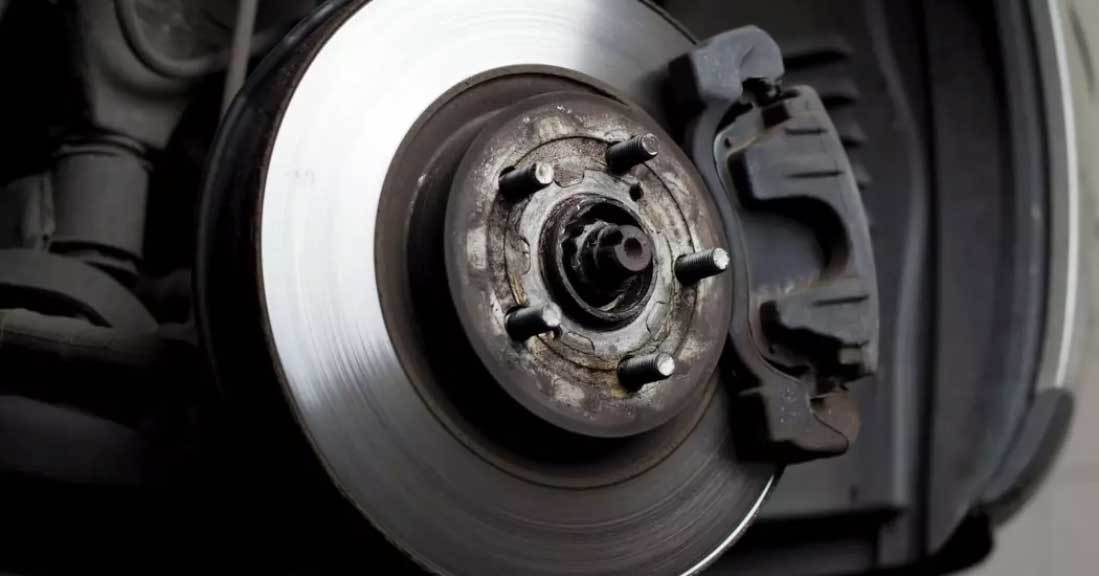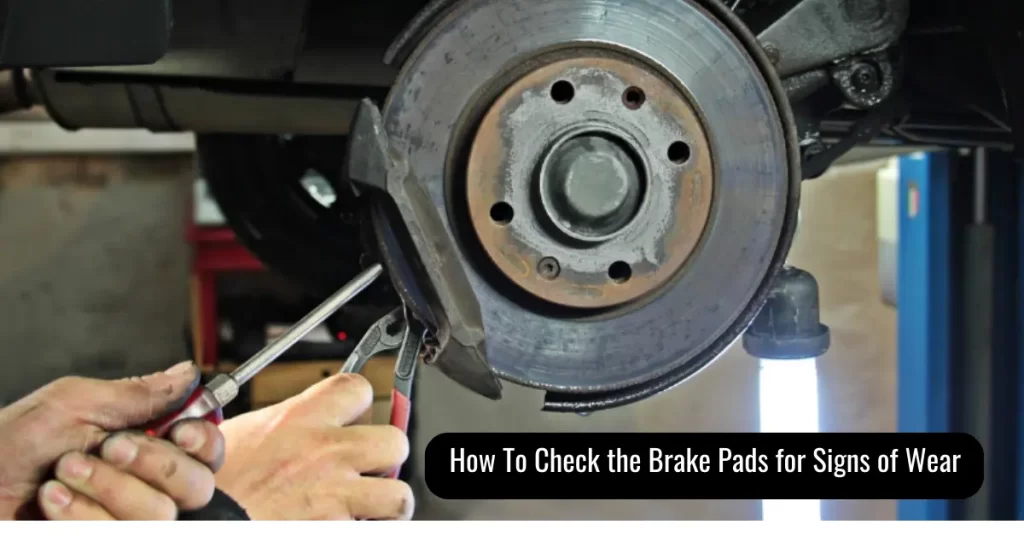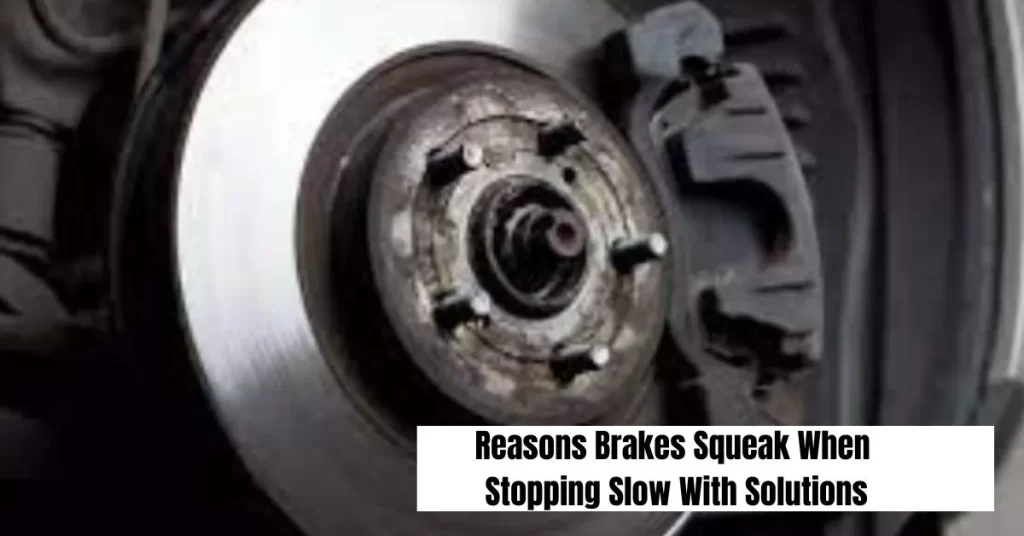6 Reasons Brakes Squeak When Stopping Slow With Solutions
Brakes squeaking when stopping slowly can be a nuisance and make your driving experience unpleasant. This noise is usually caused by worn brake pads not gripping the rotors’ surface properly. This sound is even more common if your car has been left to sit for an extended period of time without being used. Bad installation or poor brake lubrication can also contribute to this issue.
Moreover, dust, dirt, and other contaminants can also cause the sound if they accumulate on your brake components over time. No matter what causes it, an expert technician should quickly diagnose and fix any problems with your braking system at IJP Automotive. Read on to learn more about this issue more in detail.
What Does It Mean to Have A Squeaky Brake?
Squeaky brakes are an unmistakable sign that you need brake service. When you step on the brake pedal, a loud screeching indicates it is time for new brake pads. The problem may be due to misaligned or worn-out rotors, which can cause inadequate contact with the brake pads when stopping, leading to a high-pitched noise.

New brake pads may sometimes squeak until they reach sufficient heat levels and perform at peak efficiency. This is especially true in cold weather and happens more often with organic or low-metallic compositions. Fortunately, in most cases, simply breaking them in by driving slowly improves their function. However, if your brakes are still squeaking after being replaced, you should take your car to a mechanic to check it out for any underlying issues with the rotor or caliper system.
6 Causes of Squeaky Brakes When Stopping Slow
Before diving into the causes of squeaky brakes, let us understand the types and why they squeal.
Thinning
When it comes to braking, one of the most important components is the brake pads. Over time, the wear on brake pads will cause them to become too thin, leading to a squealing sound when applying brakes. This sound is a telltale sign that it’s time to replace these brake pads before they become worse or damaged.
Most car manufacturers have detectors in the brake system that will alert drivers when their pad material is wearing down. This is accomplished by attaching a small metal tab onto the Brake Rotor disc using a rivet or push-on clip. When pressed against the rotor, it notifies the driver that there has been enough wear on the pad that it requires replacement for safe braking.
Condensation From Moisture
Condensation build-up is a common issue that affects left-out overnight vehicles. When moist air condenses on the rotors, it forms a dew. Over time this dew can build up and lead to rust formation on the rotor’s surface. When the brake pads press against the rotor, they scrape off the rust, creating a squeaky noise, particularly when they have been sitting cold overnight for longer periods. This also causes the brakes to squeak when stopping slowly.
Condensation buildup can harm the brakes and cause loud noise while braking. Vehicle owners should regularly lubricate or wax rotors to prevent moisture accumulation and rust formation after prolonged outdoor storage. Taking action now will prevent safety issues and save money on future repairs.
The brake pads Contain High Metal Content
An engine brake will usually contain metal content. This is an essential component of a vehicle’s braking system which helps reduce the rotors’ speed as it moves in contact with the brake pads. While having metal content in brake pads is considered normal, having too much of it could cause serious problems.
When brake pads have high levels of metal content, this can create loud squeaking noises as it comes into contact with the rotating rotor. The noise could pose a potential danger while driving, as it may distract drivers from paying attention to the road. Additionally, this may signal an issue with your brakes that require attention to prevent further harm. Regular brake checks are crucial to avoid potential issues. It’s important to ensure that they are working properly and that the metal content is optimal.
Glazing
Glazing of brake calipers is a common issue that causes brakes to squeal when driving a vehicle. This happens when the amount of heat created by friction and other elements on the caliper surfaces builds up, resulting in glazing over time due to wear from everyday use. Glazing leads to more heat build-up than usual with every application of the brakes, causing the brake pads to become stiff and producing an annoying squeaking sound each time they’re used. When brake components become glazed, it can significantly impair your ability to stop your car or truck as efficiently as needed.
Panic Braking
When it comes to emergency stoppings, panic braking is generally employed by drivers. Such an abrupt and aggressive stop puts tremendous pressure on the brakes resulting in increased heat generation. Excessive panic braking puts the brakes under extreme stress; it causes rapid wear to brake pads, discs, and rotors. Due to these effects, the brake will start squeaking when you apply the brakes.
Insufficient Lubrication on Drum Brakes
Regarding automotive maintenance, one of the most common issues is squeaky brakes. One potential cause of this is a lack of lubrication on drum brakes. Without lubrication, the contact points between the shoes and the drum will start to scrape against each other, resulting in a loud squealing noise.
Identifying the source of this problem isn’t too difficult either; look for signs of scraping where the bare metal is exposed. Fortunately, brake grease can be applied at these contact points between the piston and the shoe to fix or prevent squeaking brakes in no time. It’s important to know when your car has drum brakes so you can evaluate any squeaking problems and address them quickly before they become an even bigger issue.
How To Fix Brakes Squeak When Stopping Slow
Brakes squeak occurs as a result of the high pulsation of pads against the rotating discs. The caliper clamps move against the rotating disc as you apply the brakes. This process generates friction and heat, which leads to pulsation. The pulsation is the squeaky noise you hear when applying the brake pedals.
Vibration or pulsation is affected by other factors such as dust, humidity, temperature, etc. These factors can also contribute to the squeaky sounds your brakes produce when you mount them.
Fortunately, you can fix brake squeaks in easy steps. These steps are also affordable, so you won’t have any complaints about the solutions’ cost.
1. Avoid braking hard
As earlier pointed out, excessively braking hard will make your brakes squeal when stopping slowly, whether it’s a new brake pad or not. Also, avoid working out the brake pads with heavy loads. The brake system will heat up, leading to the production of squeaky sounds. Limit your load weight to reduce the brake pressure to avoid squeaky sounds.
Ensure that you maintain a driving gap between your car and the next car in front of you. This safety driving will help you avoid mounting on the brakes.
2. Use brake lubricants.
High friction is produced when brake pads rub against the rotating discs at a specific pressure and speed. Using brake lubricants to grease the brake pads will reduce friction. Brake lubricants come in several forms, such as tubes, cans, sprays, etc. This causes drum brakes to squeak when stopping slow.
3. Use high-quality grade brake pads.
Sometimes, the condition of the brake pads determines the vibration levels, which contributes to squeaky noises. In terms of replacement, buy high-quality grade brake pads. Although, you may not get replacement pads that will work exactly like the old one.
You can either use a semi-metallic brake pad, Non-Asbestos Organic, or ceramic brake pad. Semi-metallic brake pads are the most popular among them. They conduct heat very well and have one of the best stopping power. However, they tend to rust and wear down the rotor sooner than later.
NAO brake pads are quieter and cheaper than semi-metallic brake pads. The upside of this type of brake pad is that it is made with an organic filler that is resistant to heat and vibration. Just like semi-metallic, they wear quickly.
Ceramic brake pads are the best type of pads and the most expensive. It may not have the best-stopping power, but they don’t rust, are quieter, and do not produce any dust.
Choosing high-quality brake pads are essential to stopping the car and the driver’s safety. They will help prevent some avoidable circumstances that may cause you to spend more than necessary. Therefore, avoid replacing your brake pads with inferior or cheap ones.
4. Avoid leaving out your car in a cold environment overnight.
Humidity, specks of dust, and dew can collect on the rotor’s surface, leading to squeaky sounds. This happens when you leave your vehicle out in a cold or snowy environment overnight. Park your car in a temperature-controlled garage instead of out in the open.
How To Check the Brake Pads for Signs of Wear

One of the most common causes of brakes squeaking when stopping slowly is worn brake pads. To determine if your brake pads are worn and need to be replaced, there are a few simple steps you can take to check them.
First, you’ll want to inspect the brake pads for signs of wear visually. Look closely at both sides of the brake pad for any deep grooves or cracks. If you see any of these, it’s time to replace the brake pads.
Next, you’ll want to use a feeler gauge to measure the brake pad’s thickness. Place the feeler gauge between the brake pad and rotor and measure the gap. The gap should be between 1/16th and 1/8th of an inch for the brake pad to be in good condition. If the gap is more than 1/8th of an inch, then it’s time to replace the brake pads.
Finally, you’ll want to listen for squeaking or scraping noises as you press the brakes. If you hear any of these noises, it’s likely a sign that your brake pads are worn and in need of replacement.
By following these simple steps, you can easily determine if your brake pads are worn and need to be replaced. This is an important part of car maintenance, as worn brake pads can lead to decreased braking performance and increased stopping distance.
How to Stop New Brakes from Squeaking

There is no guarantee that your new brake will not squeak. Several factors can cause that. However, if you fall into the category of people complaining of their new brakes squeaking, this is how to stop it.
Check for loose parts. Loose brakes will pulsate and squeak. But tight brakes will move with your hands and respond efficiently. Once your new brake pad is squeaking, try loosening the pads, calipers, and other parts to ensure everything is tight.
Once you find out that there is a loose part, tighten it properly or replace the loose gear as soon as you can.
Use dampening paste. This paste is high-temperature grease similar to a lubricant but is effective against vibrations and squeaks. Apply a thin layer of this paste at the back of the pads. Allow drying for about 2 hours before proceeding to reinstall the pads.
How Much Does It Cost to Fix Squeaky Brakes?
If you have squeaky brakes, it’s important to have them checked by a professional. The cost of fixing them can vary depending on the severity and type of issue. A comprehensive inspection typically ranges from $80 to $115, depending on the labor fees. If your car requires new brake pads, the cost for both parts and labor can be around $300 per axle, depending on the mode depending on the model.
How to Stop Brake Squeaking in your car
Brakes Squeak When Stopping Slow FAQs
Why do my brakes squeak when going slow?
The squeaking noise in brakes when stopping slowly is caused by the high-frequency vibration of the brake pads against the disc. However, as the vehicle is pulling to a stop, the squeaking noise reduces, and then, it stops as the car stops.
Are squeaky brakes dangerous?
Squeaky brakes are not dangerous. Instead, they are a source of the disturbance. Squeaky brakes are caused by various factors such as dirt and brake dust in the lining.
Does the brake cleaner stop squeaking?
To an extent, buying a brake cleaner can stop squeaking. You can spray it on rotors in a spray can without problems.
Can a new brake squeak?
Squeaky brakes may indicate that your brakes need a replacement. But in the advent of replacing them with new ones, you still find out that your new brakes squeak when stopping. The following reasons can cause the new brake to squeak.
New brake pads may contain loads of metal fibers. Since there are a lot of metal fibers, they can press against themselves, and this can cause the brakes to squeak.
If you replaced your brakes with low-quality brake pads, it might produce an even more squeaky sound than the old ones.
If you regularly stop your vehicle abruptly, it could heat the brakes. The result would be a glaze on the pads, which maximizes squeaky sounds.
When should I check my brakes?
You should check our brakes twice in a year. This will give you an assessment of the working condition of the brake system.
I don’t experience any squeaky brakes. Is it necessary to take my vehicle for inspection?
Yes. If your vehicle is more than three years old and above, regular checkup or inspection is recommended to have fully operational brakes.
Can low brake fluid make your brakes squeak?
Having low brake fluid can cause several problems to your brakes, but not squeaks. Low brake fluids will not cause your brakes to squeak. So adding brake fluid will not solve the issue of squeaking.
Do all squeaky brakes mean they need to be replaced?
Yes! Squealing or squeaking is usually an indication that your brake pads need replacement.
How much does it cost to fix squeaky brakes?
The estimated cost for fixing squeaky brakes ranges between $750 – $1000. However, it depends on the amount of wear. That is why it’s crucial to get your brakes replaced once you hear squeaky noise.
Can I spray WD-40 on my brakes?
WD-40 offers a good lubricating option. However, it evaporates off quickly after application.
Conclusion
Squeaky brakes are detrimental to safety and car performance. It is one issue that every driver should take seriously as it affects the day-to-day driving experience. Once you notice that your brakes squeak when stopping slow, endeavor to replace the brake pads. Take your vehicle to a mechanic for a routine service check at least once every six months.
Squeaky signs are indeed healthy signs for the safety of your vehicle. If you want to minimize the risk of total damage and expenses, listen to the disc indicators. Replace worn-out parts as soon as you can to enjoy your driving experience.
